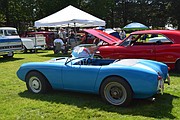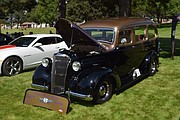Spud Run showcases classic vehicles
JOEL MARTIN | Hagadone News Network | UPDATED 8 years, 7 months AGO
Joel Martin has been with the Columbia Basin Herald for more than 25 years in a variety of roles and is the most-tenured employee in the building. Martin is a married father of eight and enjoys spending time with his children and his wife, Christina. He is passionate about the paper’s mission of informing the people of the Columbia Basin because he knows it is important to record the history of the communities the publication serves. | July 17, 2017 4:00 AM
Othello’s Kiwanis Park became hot rod heaven over the weekend, as the Spud Run car show put wheeled beauty on display. The sun did its part by reflecting dazzlingly off the various paint schemes on the vehicles, but the downside was that every available spot of shade was occupied. Some exhibitors had the foresight to bring canopies to keep the sun off. Still, the heat didn’t deter a sizable crowd of visitors from walking around in awe of the array of classics.
The variety of vehicles was impressive. There were muscle cars, Model A’s, pickups and even a few motorcycles covering nearly a century of driving history and ranging from rare models to mundane machines made magnificent.
One of the rare ones was a 1959 Berkeley owned by Jeremy Ross. You’ve never heard of a Berkeley? Neither have most folks, Ross said with a grin.
Berkeleys were manufactured in Britain in the late 1950s. They were a collaboration between a car designer and a travel trailer manufacturer that wanted to fill in the seasonal gaps in its business. Originally meant to be a small racecar, Berkeleys ran on engines derived from motorcycles and sported front-wheel drive. The designer, Ross said, was “experimenting with this new thing called ‘fiberglass.’ The factory runs were small; Ross’ car was one of fewer than 700 of its model manufactured. The company folded in 1960 and only a few hundred of any model still exist today.
Ross has had his Berkeley for about 15 years, he said, although the restoration only took about four years of serious work. That was a common theme at the show. Many exhibitors had been keeping a vehicle under a tarp or in a shed for years before deciding to fix it up to show.
Not Jerry Knebel of Quincy, though. His Chevy pickup has only had one owner: him. Knebel bought it in 1966 brand-new off the showroom floor.
“It was my farm pickup for over 30 years,” he said. About five years ago he and his son Ed made a project of it, lowering it, painting it a deep darkish red and putting in a 383-cubic-inch, 425 horsepower engine.
“Once you change anything on a vehicle, it’s not all original anymore,” Knebel said, “so we just went ahead and gave it a complete restoration. Only things original on it are the body, glass and frame.”
“It was in good enough shape, though, that we could have gone 100 percent original with it,” he added. “It’s my baby.”
Brett and Corinne Butcher of Pasco told a different story of their 1937 Chevrolet Suburban. “For years growing up I wanted a ’37 coupe that my uncle had,” Brett said. “He wouldn’t sell it. Finally in 1984 I came home on leave and he still wouldn’t sell it, but he took me out back of his shed and there standing in the weeds was this Suburban. I yelled ‘sold’ before he even had a chance to ask.”
The vehicle cost Brett $300 and languished until 2012, when he took it into his garage and began restoring it. While he was working on it, Corinne noticed some very faint lettering on the side. Brett gingerly sanded through a layer of paint to reveal the words underneath: “Bethesda Sanitarium.”
A little internet research revealed that the Bethesda Sanitarium had been established as a hospital for tuberculosis patients in Denver in 1910, and continued in that capacity until 1950, when it became a mental hospital. The hospital itself had closed by the time the Butchers went looking, but the library in Missoula, Mont. turned out to have a book written by the director of the hospital in the 1950s. The Butchers tracked down a copy of the book, and sure enough, there was a photo of their van in front of the hospital. The director/author, Meindert Bosch, was alive and well and living in a retirement center built on the grounds of the old hospital, and was happy to sign the book and help the Butchers recreate the photo in 2013 by posing the van in the exact same spot.
Not all the vehicles were restored to their original condition, of course. There was an antique two truck with chrome skulls lined up on the engine head, and a 2012 Lexus that appeared to have been turned into a post-apocalyptic dune buggy.
At a little after 4 p.m., first- and second-place trophies were awarded for different categories and eras of vehicles. A list of those awards was not available at press time.
ARTICLES BY JOEL MARTIN

Space Burger booth open March 13-15
MOSES LAKE — Those who can’t wait for the Grant County Fair can get their Space Burger fix next weekend, according to an announcement from the Lioness Club of Moses Lake. The iconic Grant County sandwiches will be available at the Grant County Fairgrounds March 13-15, according to the announcement. There is no admission fee to get into the fairgrounds that weekend.

SENIOR EVENTS: March 2026
COLUMBIA BASIN — Plays, art shows, auctions and more await seniors in the Columbia Basin this month. Here are some opportunities to get out and about in March.

Valentine’s Day cards flood Brookdale Hearthstone with love
MOSES LAKE — Residents at Brookdale Hearthstone Assisted Living in Moses Lake got Valentine’s Day greetings from across the country last month. “I believe that the only states we have not received (cards from) yet are Vermont and Maine,” Lifestyle Director Imelda Broyles said Feb. 24. “We keep receiving new cards every single day. They have not stopped. My residents are in awe with every single one of the cards that we’ve been receiving.” The Hearts Across America project started as a way for children in school classrooms to exchange Valentine’s Day cards with classes in other states or even countries, but the idea has expanded to senior living facilities, according to the project’s social media.





